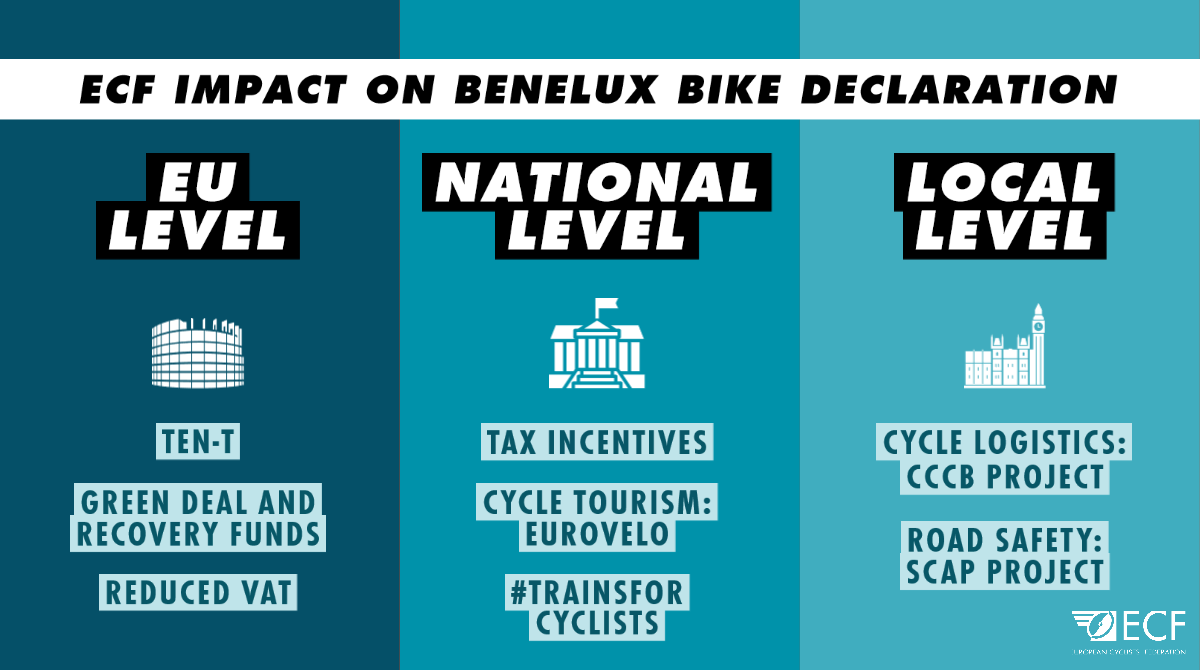August 30, 2020 - In a joint political declaration on July 14, Belgium, Luxembourg and the Netherlands called on the EU to prioritise cycling in the post-virus recovery. Benelux Ministers of Transport presented to the European Commission Vice President, Frans Timmermans, a list of cycling policy measures that are also a core part of ECF’s main priorities and projects. We analyze here ECF’s impact on this initiative.

The COVID-19 crisis has quickly changed Europe’s stance on active mobility. During the lockdown periods, cycling has increased in many cities and rural areas of Europe as one of the safest mobility options. New bike lanes have popped up from Berlin to Lisbon and several policy makers have noted the positive impact of cycling on the environment, the economic recovery or the public health. The Benelux states took a decisive step for cycling by launching a political declaration addressed to all European authorities calling upon them to join the growing ‘momentum’ of the cycling movement.
We are very pleased to see Benelux Transport Ministers citing the benefits of cycling that the ECF has been promoting for years: From the provision of safe, high-quality cycling infrastructure to the allocation of EU funds to cycling as part of the European Green Deal. Here is how ECF’s work impacted the recommendations put forward by the Benelux Bike Declaration:

At the European Union level
- Allocating EU funding to bicycle policy has been ECF’s primary battle for years. In line with what these three governments are calling for in the declaration, we recently sent an joint letter with 5 cycling organizations to EU institutions on how to put cycling at the core of COVID-19 recovery, following the EU Green Deal goals.
- The Benelux also proposes to use the ongoing revision of the TEN-T regulation to optimize co-funding possibilities for the construction of bicycle infrastructure, as well as broaden eligibility of bicycle projects in the definition of urban nodes. The ECF closely follows the TEN-T revision process and also advocates for the integration of cycling into projects on other networks. We push for including EuroVelo, the European cycle route network, as another TEN-T network – in addition to existing networks for road, rail and inland waterways.
- In the declaration, there is also a call upon the European level to allow member states to apply a reduced VAT rate on the sales of (electric) bicycles under Directive 2006/112/EC. With the current Regulation, there is no reduced VAT possible on bicycles but they were included in the Commission’s proposed revision of this Directive. ECF has been advocating for extending the VAT exemption for bicycles and e-bikes, as an alternative to make cycling more accessible and attractive for social groups that do not normally cycle.
At the national level
- Transport Ministers of Benelux call upon the Member States to provide the European Commission with data on active mobility in order to come to a clear understanding of bicycle use at EU level. ECF has been calling for more and better-harmonised data collection on cycling use in Europe for many years (our proposals are summarised in Chapter 11 of the EU Cycling Strategy). The use of crowdsourcing and ‘big data’ allows for more accurate and detailed information about cycling and people who cycle in Europe.
- We have also been involved in the development of the Sustainable Urban Mobility Indicators (SUMI) for European cities. The SUMI data collection is essential for the Sustainable Urban Mobility Plans (SUMPs), that according to the signatories of the Benelux Bike Declaration “enables policy makers at the local, regional and national levels to estimate the economic value of the health benefits of increased cycling”.
- On the financial bike stimulation point of the declaration, we recommend that policy makers use our tool on tax incentives and purchase schemes for cycling. This is an easy-to-use instrument that compares cycling fiscal incentives among EU countries.
- The Benelux call on national governments to assess where bike use can have the largest impact in reducing motorised congestion. In the FLOW project, ECF developed a user-friendly methodology, involving traffic modelling, to assess the effectiveness of walking and cycling measures in order to tackle urban congestion.
- It is great news to find the promotion of Eurovelo as one of the Benelux political priorities at national level. To restart tourism in a safe way, avoiding overcrowding, national and regional decision makers will need to invest in local and sustainable cyclo tourism.
- Bicycles and trains, the mobility keystone of the ‘new normal’, need to go hand-in-hand in Europe. Benelux Transport Ministers encourage train operators to provide sufficient space for bikes when purchasing new equipment. ECF, which has been following the revision of the Rail Passenger Rights regulation, calls on the EU to go further by guaranteeing dedicated space for at least 8 assembled bicycles on all European trains. Follow our #TrainsForCyclist active campaign!
At the regional/local level
- We welcome the Benelux initiative to promote cargobike for zero-carbon city logistics. ECF has been exploiting the limitless potential of cargo bikes in the project City Changer Cargo Bike (CCCB). This project fosters exciting developments that – among other things – offer more sustainable logistics operations, improve public spaces, engage citizens, and reduce traffic congestion.
- Last but not least, Benelux ministers suggest local authorities must ensure the road safety of cyclists. They propose measures such as applying speed limit reductions or implementing shared spaces with priority for pedestrians and cyclists. The SCAP Best Practice Guide, elaborated by ECF in the Safer Cycling Advocate Program, contains an excellent guide of positive measures that can be adopted to promote cycling and cycling safety. It is based on the experiences of the Netherlands and Denmark, two countries that have developed significant expertise in the field of cycling safety.
Cycling must be given preferential treatment in the EU COVID-19 recovery policies and funds. We encourage all European decision makers to join the Benelux initiative and to explore with ECF and our members, the great benefits of boosting bicycles in the mobility schemes. It is time to collaborate and work together to make Europe the leading continent in sustainable mobility policies, a goal that will require an EU cycling strategy.
















